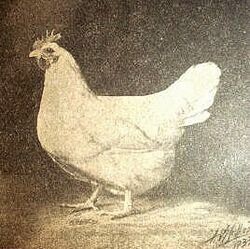Biology:Lamona
 Illustration of a Lamona pullet from 1933 | |
| Country of origin | United States |
|---|---|
| Traits | |
| Skin color | yellow |
| Egg color | white |
| Comb type | single |
| Classification | |
| APA | American[1] |
| ABA | single comb clean legged |
| |
The Lamona is an American breed of chicken. It was developed from 1912 by Harry S. Lamon, who was the senior poultry expert of the Bureau of Animal Industry, at the Beltsville Agricultural Research Center of the U.S. Department of Agriculture in Beltsville, Maryland.[2]:28[3]
History
Harry S. Lamon was the senior poultry expert of the Bureau of Animal Industry of the U.S. Department of Agriculture. From 1912, working at the Henry A. Wallace Beltsville Agricultural Research Center in Beltsville, Maryland, he crossed white Plymouth Rocks, silver-gray Dorkings and white Leghorns to produce a breed with good egg-laying capabilities which would – unlike most layer breeds – also provide a moderately tender carcase when its laying career was over.[2]:28 In 1933 this was admitted to the Standard of Perfection of the American Poultry Association as the Lamona.[4]:54 A bantam Lamona was recognized by the APA in 1960.[4]:54
By the 1980s, Lamonas were close to extinction.[4]:54 Some breeders, among them Marion Nash of Illinois, perpetuated the breed for a time.[4]:54 The American Livestock Breeds Conservancy reported one or two breeding flocks still in existence in 2005.[5] In 2013 it reported that it had been unable to identify any remaining stock descending from the original breed.[6]
Characteristics
Lamonas weigh more than the light Leghorn, but less than the large Plymouth Rock and Dorking. They have yellow skin and white plumage, which makes them ideal meat birds for the U.S. market. They have single combs and – unlike other breeds that lay white eggs – red earlobes.[4]:54 Unlike most layer hens, Lamonas remain moderately tender as a meat bird after their laying career is over.[2]:28
References
- ↑ APA Recognized Breeds and Varieties: As of January 1, 2012. American Poultry Association. Archived 4 November 2017.
- ↑ 2.0 2.1 2.2 Carol Ekarius (2007). Storey's Illustrated Guide to Poultry Breeds. North Adams, Massachusetts: Storey Publishing. ISBN 9781580176675.
- ↑ "Records of the Bureau of Animal Industry". archives.gov. National Archives and Records Administration. https://www.archives.gov/research/guide-fed-records/groups/017.html. Retrieved 2008-06-21.
- ↑ 4.0 4.1 4.2 4.3 4.4 Christine Heinrichs (2007). How To Raise Chickens. St. Paul, Minnesota: Voyageur Press. ISBN 9780760328286.
- ↑ "Lamona Chicken". http://albc-usa.org/cpl/lamona.html.
- ↑ Texas Longhorn, Morgan Horse, and Others Added to CPL. Pittsboro, North Carolina: The Livestock Conservancy. Accessed January 2021.
 |

